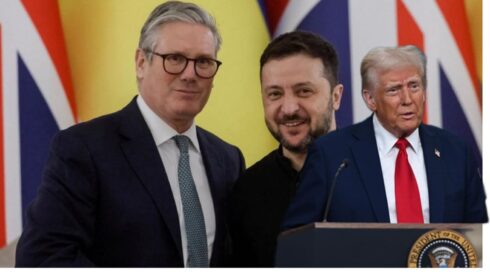Donald Trump’s special envoy, Steve Witkoff, has dismissed British Prime Minister Sir Keir Starmer’s plan for an international peacekeeping force in Ukraine, calling it “a posture and a pose.” Speaking in an interview with pro-Trump journalist Tucker Carlson, Witkoff criticized the idea as overly simplistic, accusing European leaders of adopting a misguided Churchillian approach to the conflict.
Starmer had proposed assembling a “coalition of the willing” to provide military security guarantees for Ukraine in a post-war scenario. However, Witkoff argued that such efforts were unnecessary, pointing to NATO’s existing deterrent power and downplaying fears of Russian territorial expansion beyond Ukraine. “The idea that Russia is going to march across Europe is preposterous,” he said.
Praise for Putin and Kremlin Talking Points
During the interview, Witkoff made controversial statements praising Russian President Vladimir Putin, calling him “super smart” and “gracious.” He revealed that Putin had recently gifted Trump a commissioned portrait and claimed the Russian leader had prayed for Trump following an assassination attempt last year.
Beyond personal admiration, Witkoff echoed several Kremlin narratives about Ukraine, repeating the claim that Ukraine is “a false country” and questioning global recognition of occupied Ukrainian territories as Russian. He suggested that the annexation of Crimea and parts of eastern Ukraine was justified, stating, “The Russians are de facto in control of these territories. The question is: will the world acknowledge that those are Russian territories?”
Inaccuracies and Disputed Claims
Witkoff made multiple assertions during the interview that are either disputed or demonstrably false. He incorrectly referred to four annexed regions of Ukraine, struggling to name them, when in fact Russia has claimed five: Luhansk, Donetsk, Zaporizhzhia, Kherson, and Crimea. He also falsely claimed that Ukrainian forces in Kursk were surrounded, a statement denied by the Ukrainian government and unverified by independent sources.
Additionally, Witkoff defended the widely discredited “referendums” held in Russian-occupied Ukrainian regions, arguing that the “overwhelming majority” of residents voted to join Russia. However, international observers and Ukrainian officials have long dismissed these referendums as sham votes held under coercion and military occupation.
Trump’s Stance on Ukraine and Starmer’s Security Guarantees
The disagreement between Witkoff and Starmer reflects broader divisions in U.S.-UK relations regarding Ukraine. During a White House meeting on February 27, 2025, Starmer pushed for strong U.S. security guarantees for Ukraine, while Trump played down the need for military intervention, instead advocating for a U.S.-Ukraine minerals deal as a security arrangement.
Trump has previously criticized European leaders, including Starmer and French President Emmanuel Macron, for their handling of the Ukraine war. He has also clashed with Ukrainian President Volodymyr Zelenskyy, accusing him of leading “a dictatorship without elections” and claiming that Kyiv holds little leverage in negotiations.
Future of Ceasefire Talks and U.S.-Russia Relations
Witkoff suggested that a ceasefire in the Black Sea region could be implemented “within the next week,” with the prospect of a broader 30-day ceasefire soon following. However, the details remain uncertain, particularly given Russia’s past reluctance to honor such agreements.
Looking ahead, Witkoff hinted at Trump’s vision for future U.S.-Russia cooperation, advocating joint efforts in Arctic energy policies, shared maritime routes, and artificial intelligence research. “Who doesn’t want to have a world where Russia and the U.S. are doing collaboratively good things together?” he asked.
Despite Witkoff’s optimism, his remarks and Trump’s stance on Ukraine have raised concerns among European allies. With Starmer pushing for a firmer Western response and Trump seeking to reset relations with Moscow, the future of Ukraine remains a contentious issue between the U.S. and its key partners.














